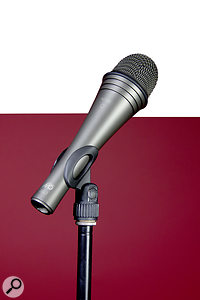Most handheld mics are of the cardioid variety, but as this model proves, a moving-coil design needn’t be directional to be good.
The omnidirectional microphone is often overlooked and ignored in favour of its directional cousins, the cardioid, hypercardioid, supercardioid, and so on. However, the humble omni has many useful strengths on its side, and I’ve always been a bit of a fan.
For example, a big weakness of classic cardioids, especially with large-diaphragm designs, is the inherent coloration imposed on unwanted ‘spill’ sounds arriving off-axis. Yes, that unwanted spill will be a bit quieter than it would be on an omni in the same position (depending on the angle of incidence), but the coloration imposed upon it can often make the spill far more obvious and intrusive, in a perverse kind of way. In contrast, if the spill sounds natural it tends to blend much more easily with everything else in the mix.
And then there’s the basic physics of the pressure-operated capsule to consider, which means an omni mic has no proximity effect at all, ever, and isn’t susceptible to mechanical handling vibrations or wind noise in the way that directional ‘pressure-gradient’-capsule mics always are.
What this all means in practice is that in situations where the mic is going to be handled and swung about, or used out of doors, or in situations where the sound character of the spill might be important (when recording an entire band in a studio), choosing an omni microphone might well make a lot of sense and work far better than many might fear! Dynamic omnidirectional mics are the mainstay of roving broadcast radio reporters because they don’t need phantom power from the recorder, they are unaffected by handling noise or being waved about, they are extremely robust, and the tonal balance is not dependent on the distance between mic and source(s).
The lack of spill coloration, good handling attributes, and freedom from popping and blasting also makes a dynamic omni a practical option for live stage speech and vocal work too — although very high levels of foldback from on-stage wedge monitors might favour a directional mic instead. And they also find plenty of favour in studio applications, on a wide variety of instruments as well as vocals.
The Range
Microtech Gefell have always made exceedingly good microphones, albeit at the top end of the budget scale, and their MD100 range of dynamic microphones is no exception. There are currently six models in the line-up, comprising cardioid (MD100/101), supercardioid (MD110/111) and omni (MD120/121). The +1 variants differ only in having a shortened body to accommodate third-party plug-on radio transmitter modules for wireless applications. All versions are elegantly styled, but for those of a certain age they may well bring to mind AKG’s D300 series stage microphones from the ’80s!
The mic is shipped with a smart wooden, foam-lined box, complete with an optional plastic ring which can be slipped into a recess in the XLR socket to provide a more snug fit if required for undersized connectors.
In truth, MG don’t actually make the dynamic capsules employed here; they come instead from another specialist German company called MTL (Mikrofontechnik Leipzig). Interestingly, the design features an oversized coil around the capsule in a humbucking arrangement to provide extremely high rejection of electromagnetic fields. Good mechanical vibration resistance comes courtesy of an internal elastic suspension system.
Weighing in at a comfortable 375g, the omnidirectional MD120 mic has a nice balance in the hand, and measures 53mm in diameter at the widest part and 198mm in length. The dark satin bronze finish looks classy, and the tough wire mesh grille windshield contains a second inner fabric layer to protect the capsule and provide very good wind and blasting resistance.
Microphone sensitivity is given as 1.5mV/Pa, which is fairly typical for a dynamic capsule of this kind, and the frequency response at the -3dB points is about 85Hz to 15kHz. (Gefell claims 50Hz-18kHz, but the published frequency plot suggests those limits are around -8dB). The frequency response is commendably flat (±1dB) between 200Hz and 6kHz, with gentle roll-offs below and above.
The overall tonal character is very smooth and natural, with excellent speech intelligibility which works extremely well with spoken voice. The absence of any kind of presence peak might reduce the mic’s ability to cut through unaided in a complex stage mix, but the upside is that the mic is usefully resistant to resonant or peaky monitor feedback in live-sound applications.
Looking at the polar response, the MD120 provides a virtually perfect omni pattern up to 4kHz, above which it narrows (as all mics of this type do), becoming progressively more cardioid. Even so, there are no evident vices, and any source within ±30 degrees of the on-axis direction will retain a perfect frequency response. Off-axis sound sources are captured with a smooth and inoffensive HF roll-off above 4kHz.
The MD120 is a very high-quality microphone that sounds very natural and performs superbly well, and will undoubtedly last a lifetime. However, I fear its current pricing makes it something of a niche option in comparison to the more competitively priced options from Sennheiser, Beyerdynamic, and Electro-Voice, among others.
Alternatives
The most popular dynamic omni mics used in broadcasting, on stage and in the studio include the Electro-Voice RE50 and 635A, the Beyerdynamic M58, and Sennheiser’s MD21 and MD42 models, all of which are considerably less expensive than the MD120.
Pros
- Very neutral sound balance.
- Robust.
- Excellent rejection of external electromagnetic fields.
- Well weighted and balanced.
Cons
- Only the price.
Summary
A very high-quality omnidirectional dynamic mic with stage, studio and broadcast applications.

